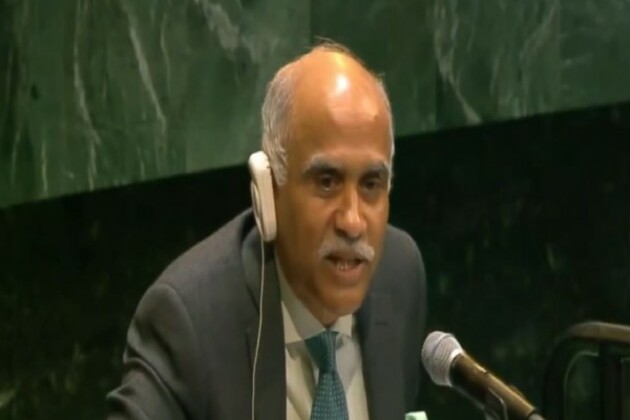Even before deepfakes, tech was a tool of abuse and control
The Conversation
03 Oct 2023, 00:08 GMT+10

Of the many "profound risks to society and humanity" that have tech experts worried about artificial intelligence (AI), the spread of fake images is one that everyday internet users will be familiar with.
Deepfakes - videos or photographs where someone's face or body has been digitally altered so that they appear to be doing something they are not - have already been used to spread political disinformation and fake pornography.
These images are typically malicious and are used to discredit the subject. When it comes to deepfake pornography, the vast majority of victims are women. Generative AI - technology used to create text, images and video - is already making image-based sexual abuse easier to perpetrate.
A new set of laws in the UK, will criminalise the sharing of deepfake pornography. But with the attention on AI and deepfakes, we cannot forget how less sophisticated technology can be used as a tool of abuse, with devastating consequences for victims.
Tech and control
When I began my research into technology in abusive relationships, deepfakes were just a blip on the horizon. My work focused on the role of smartphones in the abuse of women who had fled controlling relationships. I found that perpetrators of domestic abuse were using technology to extend the reach of their power and control over their partners, a modern take on abuse tactics that were used long before smartphones were in every pocket.
Mobile phones can be used directly to monitor and control, using GPS tracking or by bombarding a victim with texts, videos and voice calls. One participant in my research in 2019 explained how her abusive partner used his phone to access social media, sending her offensive pictures via Instagram and persistent and offensive WhatsApp messages.
When she was out with her friends, he would first text, ring and then video call her constantly to check where she was and to see who she was with. When the participant turned off her phone, her then-partner contacted her friends, bombarding them with texts and calls.
This participant felt too embarrassed to make arrangements to meet with her peer group and so stopped going out. Others in similar situations might be excluded from social plans, if friends want to avoid being contacted by their friend's abuser. Such social isolation is a frequent part of domestic abuse and an important indicator of controlling relationships.
According to the domestic violence charity Refuge, more than 72% of people who use its services report abuse involving technology.
Mobile phones are a gateway to other gadgets, via the "internet of things" - devices that are web-connected and able to exchange data. These tools can also be weaponised by abusers. For example, using mobile phones to change temperature settings on a household thermostat, creating extremes from one hour to the next.
Confused by this, people seek explanations from their partner only to be told that this must be a figment of their imagination. Gaslighting techniques such as this make victims question their own sanity which undermines their confidence in their own judgment.
A modern panopticon
With the click of a button, mobile phones allow for unprecedented surveillance of others. In the pocket of a perpetrator, they can be used to keep tabs on current and former partners any time, any place and - signal permitting - anywhere. This gives perpetrators a power of omnipotence, leaving victims believing that they are being watched even when they are not.
This brings to mind the work of the 18th-century philosopher Jeremy Bentham, who introduced the concept of the "panopticon". Bentham proposed a "perfect" prison system, where a guard tower sits in the centre, surrounded by individual cells.
Isolated from one another, prisoners would see only the tower - a constant reminder that they are permanently watched, even though they cannot see the guard within it. Bentham believed such a structure would result in the prisoners' self-surveillance until eventually no locks or bars were needed.
My most recent research shows that mobile phones have created similar dynamics within abusive relationships. Phones take the role of the tower, and perpetrators the guards within it.
In this modern panopticon, victims can be out and about, visible to strangers, friends and family. Yet because of the presence of the phone, they feel they are still being watched and controlled by their abusive partners.
As one participant put it: "You feel there's no freedom even when you're out. You feel like you are locked up somewhere, you don't have freedom, someone is controlling you."
Survivors of abuse continue to monitor themselves even when the perpetrators are not there. They act in ways that they believe will please (or at least not anger) their abusers.
This behaviour is often viewed by others as strange, and too readily dismissed as paranoia, anxiety or more serious mental health issues. The focus becomes about the victim's behaviour and ignores the cause - abusive or criminal behaviour by their partner.
As technology becomes more sophisticated, the tools and strategies available to abusers will continue to evolve. This will extend perpetrators' reach and present new opportunities for surveillance, gaslighting and abuse.
Until tech companies consider the experiences of domestic abuse survivors and build safety mechanisms into the design of their products, abuse will continue to remain hidden in plain sight.
If you are concerned about safety and abuse related to technology, please visit this advice page from Refuge, the UK's largest domestic abuse charity.
Author: Tirion Havard - Associate Professor of Social Work, London South Bank University 
 Share
Share
 Tweet
Tweet
 Share
Share
 Flip
Flip
 Email
Email
Watch latest videos
Subscribe and Follow
Get a daily dose of Beijing Bulletin news through our daily email, its complimentary and keeps you fully up to date with world and business news as well.
News RELEASES
Publish news of your business, community or sports group, personnel appointments, major event and more by submitting a news release to Beijing Bulletin.
More InformationTechnology
SectionUS seeks global support to block China’s access to American chips
WASHINGTON, D.C.: Commerce Secretary Howard Lutnick said the Trump administration is asking companies and foreign governments to help...
Pentagon chief offers choice between war and defense
Pete Hegseth is conducting a poll among the public about renaming the agency he heads as the Department of War US Defense Secretary...
'Severance' renewed for third season
Washington [US], March 22 (ANI): Apple has officially renewed its critically acclaimed thriller series 'Severance' for a third season,...
Trump announces Pentagon's decision to move forward with Sixth-Generation Fighter jet F-47
Washington DC [US], March 22 (ANI): US President Donald Trump announced the Pentagon's decision to proceed with the development of...
"New York Times is pure propaganda": Musk slams NYT after Trump calls it "discredited media"
Washington DC [US], March 21 (ANI): Tech billionaire Elon Musk slammed the New York Times on Friday in a post on X, hours after US...
Indian Ambassador to UN stresses need for responsible, ethical AI
New York [US], March 21 (ANI): India's Permanent Representative to the United Nations, Ambassador Parvathaneni Harish, has stressed...
Business
SectionGold rally gains momentum as Citi lifts target to $3,200
NEW YORK CITY, New York: Gold's record-breaking rally is expected to continue, with Citi Research increasing its three-month price...
Data center safety system nearly sparked US power crisis
BOSTON, Massachusetts: A routine safety mechanism at data centers nearly triggered a regional power crisis last summer, highlighting...
Air France unveils luxury first-class suite to lure elite travelers
PARIS, France: Air France is making a bold bet on luxury travel with the launch of an upgraded first-class suite, aiming to attract...
US homebuilding, manufacturing jump in February, but tariff costs loom
WASHINGTON, D.C.: U.S. home construction and manufacturing activity surged in February, but rising costs from tariffs and economic...
U.S. stock markets end marginally higher at week's-end
NEW YORK, New York - Uncertainty continues to plague investors on Wall Street with Friday's trading being volatile and weak. The major...
US factory output rises in February, led by auto rebound
WASHINGTON, D.C.: U.S. factories ramped up production in February, with a sharp rebound in motor vehicle output helping to drive manufacturing...













